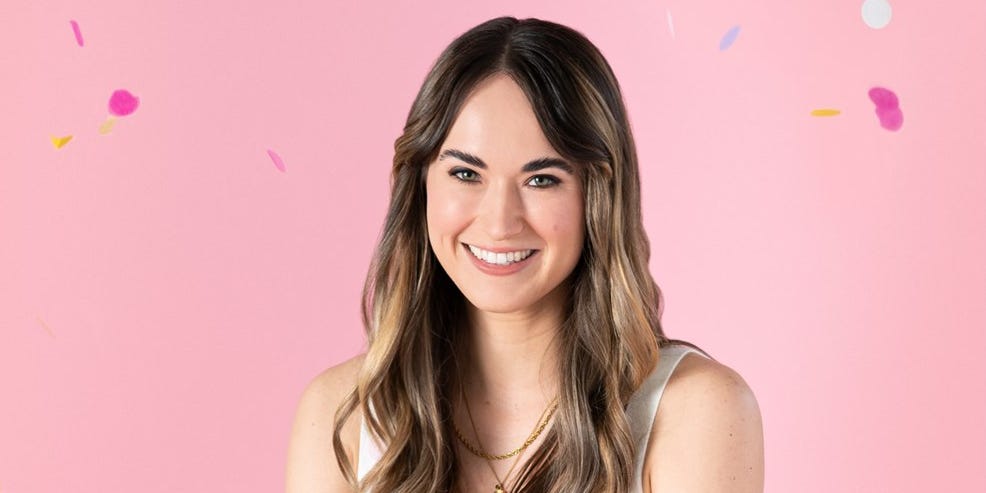SOCIAL
How I Built a Six-Figure Side Hustle Making User-Generated Content

- Kelly Rocklein has been a creative director and user-generated-content creator for over nine years.
- Working 10 to 15 hours a week, she made more than $100,000 in 2022 creating UGC for clients.
- She’s now also a UGC coach on TikTok, and she offers coaching, a newsletter, and other resources.
This as-told-to essay is based on a conversation with Kelly Rocklein, a 28-year-old user-generated-content creator in Bend, Oregon. Insider has verified her income with documentation. The following has been edited for length and clarity.
I’m a creative director with a part-time gig as a user-generated-content, or UGC, creator. UGC is sort of a misnomer in digital marketing because it’s actually user-generated content paired with creative strategy that performs for clients. There are two types of UGC: organic, which is posted to a brand’s feed to grow its following; and paid media, which is a concept that’s launched as an ad to create sales. I specialize in paid media.
I dropped out of college in 2015 to pursue UGC, video editing, and creative strategy. I’m entirely self-taught, and over the past nine years, I’ve worked with more than 500 brands in fashion, skincare, makeup, health, tech, and consumer-packaged goods.
I charge between $500 and $2,000 per concept because my concepts lead directly to sales — my top-two UGC ads for one of my clients made them more than $10 million in revenue. In 2022, while working 10 to 15 hours a week and taking more than six weeks off throughout the year, my UGC side hustle brought in more than $100,000. I can work so few hours because I’ve built my business to a point where I no longer have to do cold outreach — all of my current clients are from referrals.
I started doing UGC and video editing for fun in 2014
Miranda Kelton Photography
At the time, I didn’t know the term UGC and just referred to it as content creation. I didn’t have the understanding of this term until I went corporate and became familiar with the creative strategy I’d been doing all along. In September 2015, I took a gap year with the hope of being able to turn my then hobby into my career. I told myself if it didn’t work out by the annual marker, I’d go back to school.
Between then and May 2016, I worked part time, lived at home, and built my UGC portfolio. I figured the only way I’d get hired was if I had a portfolio that was attractive to the brands I wanted to work with. I created example concepts with products I already had in my house and loved using.
In less than eight months, I secured my first client and was able to afford to move out. In summer 2016, I moved to LA to build my career as a creative-marketing professional.
In fall 2018, after working as a creative contractor up to that point, I started working full time for a digital-marketing agency as a senior direct-response video editor. I started at a new agency in summer 2020, and in fall 2021, I became the creative director for a direct-to-consumer brand while still building my UGC business on the side.
I make my UGC ads feel natural
Although my UGC concepts are launched as ads, I make them feel like your friend posted it. Most best practices revolve around the direct-response formula: a captivating hook in the first three seconds, both visually and audibly.
I communicate a problem the viewer may have faced and follow up by explaining how this product is the solution. I feature the value proposition, or what I like to refer to as “unique selling points” that set the product apart from the rest of its competitors. For example, if there are already a million lotions on the market, what makes this lotion unique?
I also sprinkle in additional social proof. For example, if the product has more than 100,000 verified five-star ratings, I would say: “Not to mention, they’ve received over 100,000 verified five-star reviews — that many people can’t be wrong!”
I always end with a call to action, or CTA. Something as simple as “Get yours today for only $x!” or “Click the link for a special offer” works.
I either incorporate these elements into script reads or by taking a native trend on TikTok, like a “get ready with me” video, and filling it with marketing best practices to enhance the likelihood of more conversions. My other services include scriptwriting for $100 a script, which takes me roughly 15 minutes, and allowlisting, which is where I charge $500 a month for my clients to run ads on my Facebook and Instagram.
When I started, there were almost no useful resources
YouTube was really the only free resource, and back then it was like searching for a needle in a haystack for a suitable tutorial. I troubleshot my way through Adobe’s PremierePro for years, and it was painstaking at first. The more I practiced, the better I got.
Before I ever reached out to a brand, I researched their current running ads, who their competitors were, and what they were doing better or worse than those competitors. Contractors are meant to be a solution to an internal problem the brand might be facing, so I made sure to strategically position myself as the solution to a problem I uncovered during my brand-market analysis. It really wasn’t until 2020 that I started to see some of my hard work pay off. I cleared just shy of $20,000 that year. In 2021, I doubled that and made nearly $40,000 before breaking six figures in 2022.
Working full time at reputable digital-marketing agencies helped speed up my learning curve and make me a stronger marketer because I got so much exposure to brands in such a short period of time. Now, as a full-time creative director for just one brand, freelancing on the side as a UGC creator keeps me sharp.
I kept seeing blatant misinformation being spread about UGC on TikTok, so in June 2022 I made an account to help reset expectations and share industry best practices. People kept asking questions, and that quickly grew into people asking for additional resources, such as one-on-one coaching, writing a newsletter, and portfolio audits, which I started offering in August 2022.
You don’t need a college degree to be successful
Something I’ve learned is that it isn’t about where you went to college or even if you have a degree — it’s all about your portfolio and case studies. Brands are going to hire the person who shows that their work offers a return on investment — in marketing, brands want to see case studies featuring return on ad spend.
As a UGC creator, you have to be aware of the latest social trends and nuances in marketing. When you start this, you’re becoming an entrepreneur, and it’s not for the weak. Founder’s depression is real. Rejection hurts. Not having your ads always perform sucks. That’s business. What you choose to do after these gut punches is what separates the UGC creator who gave up after two weeks from the creator who makes four or five figures a month.















